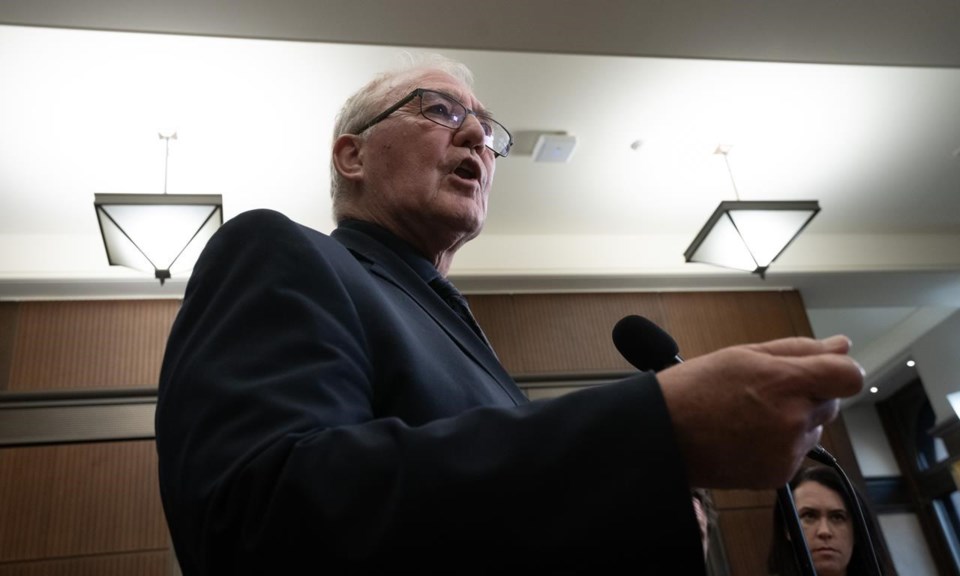HALIFAX — The war in Ukraine and the Israel-Hamas conflict in the Middle East are the result of a breakdown in international law in an increasingly dangerous and violent world, Defence Minister Bill Blair told a global security conference Friday.
Russia's invasion of Ukraine in February 2022 and Hamas's attack on Israel on Oct. 7 are overt challenges to the international, rule-based order, he said.
"In the Middle East, we have seen innocent civilians caught up in a war they did not ask for," the minister said, noting Hamas's "slaughter" of 1,200 Israelis and its taking of over 200 hostages. While defending Israel's right to self defence, Blair said, "all civilians must be protected and the law of armed conflict must be protected."
Blair is among 300 delegates from around the world attending the three-day Halifax International Security Forum, an annual event dedicated to strengthening co-operation among democratic nations.
Most of the sessions at the conference will be focusing on the war in Ukraine even though much of the world's attention has shifted to the Gaza Strip, where Israel's invasion, in response to the Oct. 7 Hamas attack, has killed more than 11,400 Palestinians, two-thirds of them women and minors, according to Palestinian health authorities.
When asked if support for Ukraine's fight is dwindling among its allies, Blair said that wasn't the case.
"I do appreciate that there are political discussions taking place in a number of our allied countries, but I have seen absolute … unequivocal support for Ukraine among those allies," he said.
It's important, Blair added, to remember that while Ukraine's allies are providing support through missions and money, "(Ukrainians) are fighting this battle with their blood."
"They are fighting on all of our behalf against a very determined challenge to the international rules-based order," he said, adding that the Ukrainian military is now having a tough time consolidating gains made last summer.
"Right now, it seems to be moving into — I'm not going to use the word stalemate — but a more static battle environment. It remains to be seen what can unlock that," he said.
Blair joined United States senators James Risch and Jeanne Shaheen in the opening panel discussion at the forum, and argued that democratic countries must work on methods to provide Ukraine with more munitions, even as their own stockpiles of artillery shells are depleted.
"We have to move beyond just raiding of the cupboard ... we've got to find ways to solve the munitions issue," he said.
Gen. Wayne Eyre, chief of the defence staff, recently told a House of Commons committee that if Canadian troops were to fire their artillery at the same rate as Ukrainian troops, their supply of shells would last for only a few days.
Still, Oleksandra Matviichuk, a Ukrainian human rights lawyer on the panel, said in an interview attitudes need to shift among Western powers helping her nation. She said often the goal is solely to "help Ukraine not to fail," rather than ensure her nation actually wins the war.
"If we don't have a joint, ambitious goal, we won't have a joint strategy," she said, as she urged Canada to contribute more modern weaponry, more quickly.
Shaheen, a Democratic party senator from New Hampshire, said she was concerned about the flow of aid to Ukraine, noting that fresh funding is mired in Congress due to a small minority of Republican members throwing up roadblocks.
"I'm very concerned about the fact we are funding our government in the United States a month at a time here," she said. "I think that is unsustainable."
However, she and Risch, a Republican senator from Idaho, also predicted that eventually the latest military aid package to Ukraine will pass through Congress.
"Things don't happen instantly in a free, democratic society," said Risch.
Forum president Peter Van Praagh said he deliberately chose to keep the focus of the event on Ukraine, not the war in Gaza, because switching the theme would have played into the agenda of non-democratic nations.
“Now (Russian President Vladimir) Putin is working to shift the world’s democracies’ attention — and their generous support for Ukraine — to other theatres," he said Thursday. “The world’s democracies must come together to stop this multi-front attack.”
Later in the day, Blair announced Ottawa would spend $26.6 million over six years to establish an innovation hub in Halifax for the North Atlantic Treaty Organization. Former defence minister Anita Anand announced the proposal last November.
The goal of the hub, known as the NATO Defence Innovation Accelerator, would be to promote co-operation between NATO's military members and the technology sector, including tech startups and academic researchers.
Blair also announced that Canada will spend $188 million to design and build a new training facility at Canadian Forces Base Halifax, Canada's largest military base.
This report by The Canadian Press was first published Nov. 17, 2023.
Michael Tutton and Michael MacDonald, The Canadian Press

